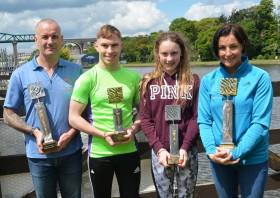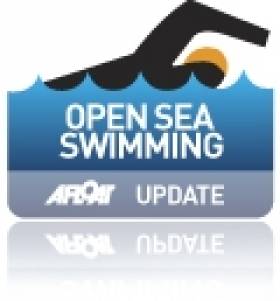Displaying items by tag: Boyne Swim
River Boyne Swim Attracts Biggest Ever Entry at Drogheda
The seventh annual Boyne Swim took place on Saturday, 10th September, with the biggest entry ever of 270 swimmers taking part on the day. It was a beautiful sunny day with excellent weather conditions, and the River Boyne was in excellent condition for the race. Competitive swimmers came from all corners of the country for the 2.7km swim, which is now a race of distinction on the national open water swim calendar. For many competitors, this swim was their ninth qualifying swim for the upcoming Liffey swim and, therefore of huge significance. Some travelled from Donegal the evening before and overnighted in the town before taking part; others were on the road from 6 am that morning!
Ray Donagh of the Boyne Swim Committee said, ‘This swim has now joined the elite group of city swims in Ireland and over the seven years has really become a big deal on the National open water swim calendar, attracting a wider audience each year. It is great for Drogheda and for the sport of open water swimming’.
Huge numbers of spectators, families and friends cheered on the swimmers the whole way from the starting point at mell to the finish line at the Boyne Fisherman’s Headquarters on Marsh Road. The atmosphere was buzzing with everyone waiting for their heroes to come into view.
 Swim 2022 Trophy Pic (l-r) Female Winner Charlotte Reid, Male Winner Donncha O Saidhail, Overall Winner (Junior Male) Finn O’Neill, Junior Female Winner Caoimhe Doyle
Swim 2022 Trophy Pic (l-r) Female Winner Charlotte Reid, Male Winner Donncha O Saidhail, Overall Winner (Junior Male) Finn O’Neill, Junior Female Winner Caoimhe Doyle
Representatives from Drogheda Port Company and Drogheda Triathlon Club presented each of the overall winners with the iconic Drogheda Port perpetual trophies, and the category winners was as follows;
Overall Winner Finn O’Neill, ESB Swim Club, with a time of 31.30 mins, Finn at only 18 years old, is still classified as a junior. His mother, Edwina Kelly, who was proud as punch is actually a native of Duleek Street in Drogheda.
- Overall Male Winner Donncha O Siadhail, Meath Master Swim Club with a time of 32.50 min
- Overall Female Winner Charlotte Reid, Aer Lingus Swim Club with a time of 35.30 mins
- Overall Female Junior Caoimhe Doyle, Drogheda Swim Club with a time of 35.47 mins
Gold, silver and bronze medal winners were presented in the many individual categories, two of which were a Drogheda Swim Club hat-trick!
The beauty of the Boyne, the stunning Ronan Halpin trophies and the prestige and challenge of the race itself has earned the Boyne Swim the reputation of being one of the best open water swims organised in the country.
The event was organised by the Drogheda Triathlon Club with the assistance of the untiring support from local volunteer groups such as the Red Cross, Boyne Fisherman’s, Drogheda Fire Service, the Coast Guard and the volunteer kayakers.
Husband-and-wife pair Tom Healy and Rachel Lee took top honours in the annual Boyne Swim through Drogheda yesterday (Saturday 15 June).
Tom claimed the overall race title with a time of 27.25 minutes, while his wife Rachel Lee finished a close second (27.58 mins) and claimed the overall female title.
The annual Boyne Swim, in association with Drogheda Port and Aura, celebrated its sixth year with 251 swimmers taking part — making it one of the most favoured events on the Irish open water swimming calendar.
“Whether it’s the beauty of the Boyne, the stunning Ronan Halpin trophies or the prestige and challenge of the race itself, swimmers arrived in their droves on Saturday to battle the 2.7 kilometre race,” said the organisers.
The course started at Mell and meandered eastwards, passing under five bridges through Drogheda Port before finishing up at the Boyne Fisherman’s headquarters.
While most swimmers entered the water in skins or wetsuits, a few others opted to brave the elements in togs or swimsuits.
This year a team from Drogheda’s Red Door Project took part in the race after training for many months. The team were swimming to raise funds and awareness for the national children’s cancer charity Aoibheann’s Pink Tie.
Each of the four category winners were presented with Drogheda Port perpetual trophies:
- Overall Winner: Tom Healy (27.25 mins)
- Overall Female Winner: Rachel Lee (27.58 mins)
- Overall Male Junior: Sean Black (30.05 mins)
- Overall Female Junior: Aoife Doran (29.22 mins)
The sixth Boyne Swim was again organised by the Drogheda Triathlon Club with the assistance of a number of local voluntary organisations.
River Boyne Swim Won By Wicklow Triathlete Brian Harris
#boyneswim – The inaugural Boyne swim which was held as part of the Irish maritime festival was won by nationally acclaimed swimmer and tri-athlete Brian Harris, Base2Race, from Ashford Co Wicklow who won the race in a time of 27.46 Minutes. The overall winning female was Rachael Lee from Dublin and the overall junior was Muiris O'Murchadha also from Dublin aged 17.
Over 150 swimmers participated in the race and the course was 2.7km on the river
Boyne going throught he centre of Drogheda and the Port and finishing South East of the famous Viaduct Bridge. It was organised by the Drogheda Triathalon Club in conjunction with Drogheda Port Company. The race is set to become part of the annual swim calendar and will join the Liffey and DunLaoighre Harbour elite swims.
The perpetual trophies for the three winning categories of the inaugural Boyne Swim were sponsored by Drogheda Port Company and have been exclusively designed and created by well-known Drogheda sculptor, Ronan Halpin who grew up on the banks of the river Boyne. He now resides in Keel, Achill Island where he showcases his stunning and unique artwork in his own public art gallery. He draws his inspiration from his maritime surroundings.































































